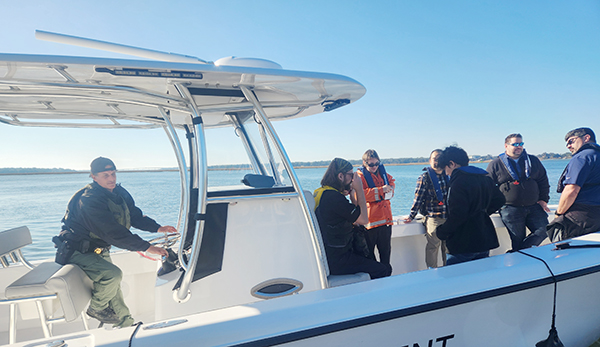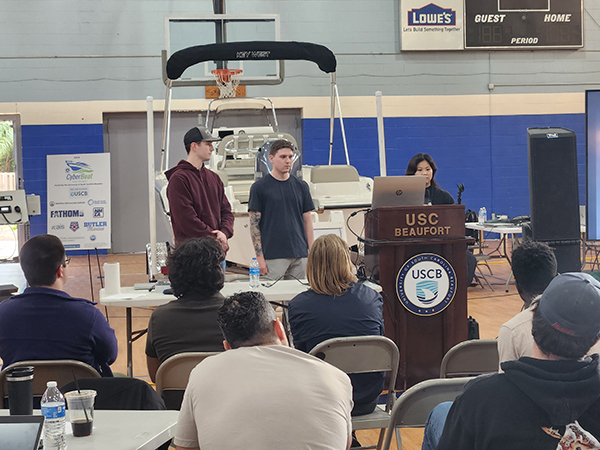USCB Grant Expands Cyber Focus Into Securing Maritime Technology

A National Science Foundation grant emphasizing maritime cybersecurity drew students, professors and industry professionals to CyberBoat Challenge 2024, hosted by the University of South Carolina Beaufort in December.
The exciting three-day event in Beaufort introduced a new generation of engineers and computer scientists to professional development in the maritime cyber world. Experts in maritime engineering, military leadership and computer technology conducted hands-on exercises and information sessions.
Then student teams carried out experiments on equipment aboard recreational boats. Some of the challenge exercises took place at Beaufort Marina. For another, a boat on a trailer was brought to the USCB campus gym.
Jeremy Daily, associate professor of systems engineering at Colorado State University and the creator of the CyberBoat Challenge, led the opening day workshop. He guided the students through building equipment that would become part of a computer network.
Daily is also the creator of the successful CyberAuto, CyberTractor and CyberTruck Challenges. He said that when the CyberBoat Challenge was offered, applications were not limited to certain fields of study.
“We wanted people who were interested in learning more, who had the initiative to explore something different. You can’t teach curiosity,” he said.

Participating students came from universities in California, Texas, Michigan, Colorado, Mississippi, Georgia, South Carolina and North Carolina, and many were accompanied by their professors or mentors.
The objective of the CyberBoat Challenge was to help students considering a career in cyber security to focus on the maritime industry.
“Much of the technology on boats and ships in the maritime space was developed by people thinking about how to make it functionally work, but not how to protect it from cyber security attacks,” explained Rick Siebenaler, CEO of the Maritime Cybersecurity Institute. “We need to focus on cybersecurity now.”
USCB’s first CyberBoat Challenge focused on recreational vessels. The hope is to hold a similar event with commercial vessels, then let students examine and work on other parts of the ecosystem in the maritime transportation system, such as ports and cranes, according to Siebenaler.
“If you can disable any portion of that chain of technology, you can suddenly shut down an entire port,” he said.
The importance of securing all maritime technology was highlighted by Chester “CJ” Maciag, director of Cyber Technologies and Academic Outreach, Office of the Under Secretary of Defense for Research and Engineering at the Department of Defense.
“Our mission is to protect our nation from various national security threats across the world or how they affect us in the homeland. Building a resilient Joint Force in the defense ecosystem means that the things we use can’t be attacked or are resilient from an attack, so that we can have the ability to operate,” Maciag said.
He noted that eight percent of the world's commerce is conducted by shipping, and 40%-50% passes through the South China Sea.
The CyberBoat Challenge event is based upon work supported by the NSF Engines Development Award: Advancing Cybersecurity Technologies for the Maritime Transportation System (SC) and funded by the National Science Foundation - Award Number 2305684.
USCB Provost Dr. Eric Skipper said the NSF grant has enabled USCB to build interest and participation by establishing a community of partners focused on maritime cybersecurity.
“This is of critical importance to ensure the uninterrupted flow of goods and commerce through our nation’s ports,” said Skipper.
The NSF grant follows a $1.3 million Department of Defense grant to support regional workforce development, including exiting military, in cybersecurity. This grant funded programs at Beaufort's South Coast Cyber Center, with the goal of transforming the Lowcountry into a center of cybersecurity expertise. The center is a 501(c)3 partnership that includes USCB, Technical College of the Lowcountry, the Beaufort Digital Corridor and Beaufort County Economic Development Corporation.
Warren Parker, South Coast Cyber Center chairman, said the aim is to create high-skilled, high-wage jobs in cyber security.
“Our basic purpose is to enhance cyber security education with cyber workforce development, encouraging cyber startups and the attraction of cyber firms to the Beaufort region,” Parker said. “There’s real opportunity, given the fact there is about a 300,000-plus shortage of cyber security professionals.”
- USCB -
Gwyneth Saunders • 12/18/2024